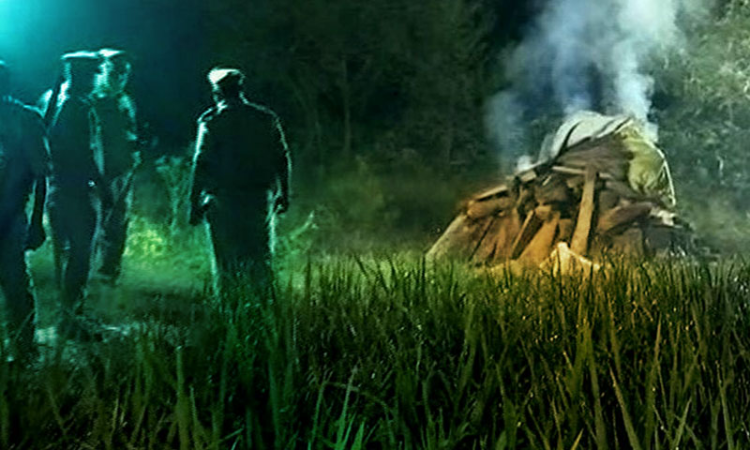When Dignity Turns In The Grave- Advocating The Rights Enuring To Corpses In India
Aditya P Khanna
16 Oct 2020 7:25 PM IST

Two hours past the stroke of midnight, when the whole nation was asleep, Hathras awoke to death and desecration. A pyre was lit, a cadaver was burnt, but there was no requiescat for the lamented. In a brazen display of subterfuge and unbeknownst to the immured family, the local constabulary surreptitiously proceeded to immolate the body of their daughter. This act of shameless ignominy was the final nail in her proverbial coffin.
Although the savage horrors of her assault, mutilation and alleged gang rape has stained India's conscience, it cannot detract from the fact that our sentinels on the qui vive have yet again failed to secure her dignity, both in life and after her demise. Be it victims of violent crimes, casualties of contagions, ailments and maladies, or even those who experience necessaria morte mori, this article emphatically avers that every individual is innately entitled to a dignified exequy. Though there are no specific laws enacted in India apropos thereto, such a legal position can clearly be elucidated through judicial precedents. At the outset however, it is imperative to understand that the said right does not simply operate ad personam. Any infraction thereof inevitably transgresses the ancillary rights of the deceased's family and concomitantly breaches the obligations of the State.
The position of law in India anent the right of the deceased can be appositely summed up in the prudent words of Haruki Marukami - 'death is not the opposite of life but an inherent part of it'. This rationale was seemingly echoed by the Supreme Court of India in the landmark case of Pandit Parmanand Katara, where it eruditely held that the right to dignity and fair treatment enshrined under Article 21 of the Constitution is available not only to a living man, but also to his body after his death. Subsequent thereto, the Madras High Court in Marimuthu's case also observed that every human being is entitled to a decent burial of his body in accordance with his culture and tradition and that any inordinate delay in sending the dead body for autopsy, when required, would constitute a violation of his right to dignity.
Furthermore, while dealing with objections raised against disposal of bodies of those who had died due to COVID-19, the Bombay High Court and the Madras High Court have recently reiterated that Article 21 of the Constitution of India includes the right to a decent burial or cremation. Consequently, a right thus enures in every person to avail a dignified obsequy that is commensurate with the faith practiced immediately before his or her demise.
Having so established the rights of the deceased, it would now be germane to succinctly delineate on how the same are intrinsically intertwined with the rights of the bereaved. In America, this concept can be clearly evinced in the landmark case of Koerber v. Patek, wherein the Supreme Court of Wisconsin categorically held that the right of the relatives to bury their dead inviolate and without interference, is one of the clearest in the gamut of civil liberties and the most worthy of preservation from the point of public welfare and decency.
In India, funeral rites are deeply ingrained in the religious and traditional practices of its populace since the days of yore. The said right can thus be cogently traced to Article 25 of the Constitution, which enshrines within itself the freedom of conscience and free profession, practice and propagation of religion in India. Based on those very deep-rooted beliefs, the Calcutta High Court recently held that the family members of a deceased who was infected with COVID-19 should not ordinarily be deprived of the right to perform his or her last rites, subject to them taking all necessary precautions.
Furthermore, it is also well recognised today that Article 21 of the Indian Constitution does not merely impose negative obligations but also levies a positive duty upon the State. Moreover, since it is abundantly apparent in this instance that the dead cannot possibly pursue any remedies, the aforesaid liberties must thus be understood to be positive rights. This idea also seems to find resonance in Vikash Chandra's case and in the case of Ashray Adhikar Abhiyan, where the Courts plainly acknowledged the obligation of the State to give a decent burial to the dead as per their religious beliefs.
Thus, in light of the above disquisition, it is patently evident that the Uttar Pradesh Police not only contravened the rights of the Hathras victim by flagrantly denying her a dignified cremation, but also violated the most basic rights of her family to do so. Curiously, even though the state has miserably failed to discharge its pious obligation, it is still audaciously endeavouring to vindicate its stand by propagating a purported threat to public order. However, even if the same somehow proves to be true, in the present case the interests of justice may have been better served if the concerned authorities had aligned their resolve with the maxim fiat justitia ruat caelum (let justice be done, though the heavens may fall).
Views are personal only
(Author is a practicing Lawyer at the Supreme Court of India)


